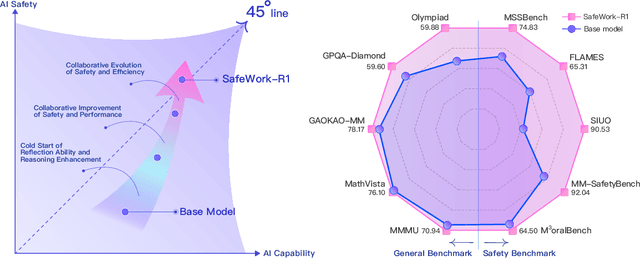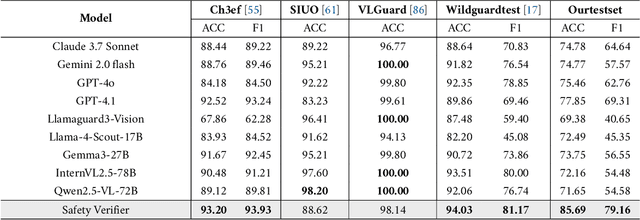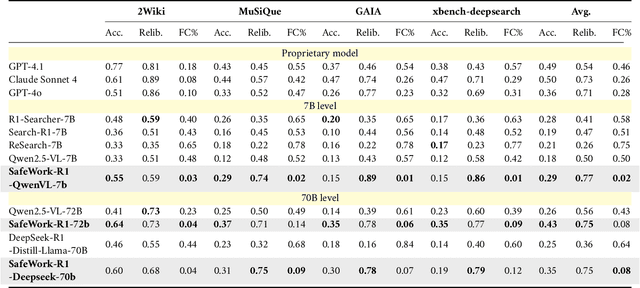Qingyu Ren
LSRIF: Logic-Structured Reinforcement Learning for Instruction Following
Jan 10, 2026Abstract:Instruction-following is critical for large language models, but real-world instructions often contain logical structures such as sequential dependencies and conditional branching. Existing methods typically construct datasets with parallel constraints and optimize average rewards, ignoring logical dependencies and yielding noisy signals. We propose a logic-structured training framework LSRIF that explicitly models instruction logic. We first construct a dataset LSRInstruct with constraint structures such as parallel, sequential, and conditional types, and then design structure-aware rewarding method LSRIF including average aggregation for parallel structures, failure-penalty propagation for sequential structures, and selective rewards for conditional branches. Experiments show LSRIF brings significant improvements in instruction-following (in-domain and out-of-domain) and general reasoning. Analysis reveals that learning with explicit logic structures brings parameter updates in attention layers and sharpens token-level attention to constraints and logical operators.
Beyond Correctness: Confidence-Aware Reward Modeling for Enhancing Large Language Model Reasoning
Nov 09, 2025Abstract:Recent advancements in large language models (LLMs) have shifted the post-training paradigm from traditional instruction tuning and human preference alignment toward reinforcement learning (RL) focused on reasoning capabilities. However, numerous technical reports indicate that purely rule-based reward RL frequently results in poor-quality reasoning chains or inconsistencies between reasoning processes and final answers, particularly when the base model is of smaller scale. During the RL exploration process, models might employ low-quality reasoning chains due to the lack of knowledge, occasionally producing correct answers randomly and receiving rewards based on established rule-based judges. This constrains the potential for resource-limited organizations to conduct direct reinforcement learning training on smaller-scale models. We propose a novel confidence-based reward model tailored for enhancing STEM reasoning capabilities. Unlike conventional approaches, our model penalizes not only incorrect answers but also low-confidence correct responses, thereby promoting more robust and logically consistent reasoning. We validate the effectiveness of our approach through static evaluations, Best-of-N inference tests, and PPO-based RL training. Our method outperforms several state-of-the-art open-source reward models across diverse STEM benchmarks. We release our codes and model in https://github.com/qianxiHe147/C2RM.
Instructions are all you need: Self-supervised Reinforcement Learning for Instruction Following
Oct 16, 2025Abstract:Language models often struggle to follow multi-constraint instructions that are crucial for real-world applications. Existing reinforcement learning (RL) approaches suffer from dependency on external supervision and sparse reward signals from multi-constraint tasks. We propose a label-free self-supervised RL framework that eliminates dependency on external supervision by deriving reward signals directly from instructions and generating pseudo-labels for reward model training. Our approach introduces constraint decomposition strategies and efficient constraint-wise binary classification to address sparse reward challenges while maintaining computational efficiency. Experiments show that our approach generalizes well, achieving strong improvements across 3 in-domain and 5 out-of-domain datasets, including challenging agentic and multi-turn instruction following. The data and code are publicly available at https://github.com/Rainier-rq/verl-if
SafeWork-R1: Coevolving Safety and Intelligence under the AI-45$^{\circ}$ Law
Jul 24, 2025



Abstract:We introduce SafeWork-R1, a cutting-edge multimodal reasoning model that demonstrates the coevolution of capabilities and safety. It is developed by our proposed SafeLadder framework, which incorporates large-scale, progressive, safety-oriented reinforcement learning post-training, supported by a suite of multi-principled verifiers. Unlike previous alignment methods such as RLHF that simply learn human preferences, SafeLadder enables SafeWork-R1 to develop intrinsic safety reasoning and self-reflection abilities, giving rise to safety `aha' moments. Notably, SafeWork-R1 achieves an average improvement of $46.54\%$ over its base model Qwen2.5-VL-72B on safety-related benchmarks without compromising general capabilities, and delivers state-of-the-art safety performance compared to leading proprietary models such as GPT-4.1 and Claude Opus 4. To further bolster its reliability, we implement two distinct inference-time intervention methods and a deliberative search mechanism, enforcing step-level verification. Finally, we further develop SafeWork-R1-InternVL3-78B, SafeWork-R1-DeepSeek-70B, and SafeWork-R1-Qwen2.5VL-7B. All resulting models demonstrate that safety and capability can co-evolve synergistically, highlighting the generalizability of our framework in building robust, reliable, and trustworthy general-purpose AI.
Order Matters: Investigate the Position Bias in Multi-constraint Instruction Following
Feb 24, 2025



Abstract:Real-world instructions with multiple constraints pose a significant challenge to existing large language models (LLMs). An observation is that the LLMs exhibit dramatic performance fluctuation when disturbing the order of the incorporated constraints. Yet, none of the existing works has systematically investigated this position bias problem in the field of multi-constraint instruction following. To bridge this gap, we design a probing task where we quantitatively measure the difficulty distribution of the constraints by a novel Difficulty Distribution Index (CDDI). Through the experimental results, we find that LLMs are more performant when presented with the constraints in a ``hard-to-easy'' order. This preference can be generalized to LLMs with different architecture or different sizes of parameters. Additionally, we conduct an explanation study, providing an intuitive insight into the correlation between the LLM's attention and constraint orders. Our code and dataset are publicly available at https://github.com/meowpass/PBIF.
Step-by-Step Mastery: Enhancing Soft Constraint Following Ability of Large Language Models
Jan 09, 2025Abstract:It is crucial for large language models (LLMs) to follow instructions that involve multiple constraints. However, soft constraints are semantically related and difficult to verify through automated methods. These constraints remain a significant challenge for LLMs. To enhance the ability of LLMs to follow soft constraints, we initially design a pipeline to obtain high-quality outputs automatically. Additionally, to fully utilize the acquired data, we introduce a training paradigm based on curriculum learning. We experimentally evaluate the effectiveness of our methods in improving LLMs' soft constraint following ability and analyze the factors driving the improvements. The datasets and code are publicly available at https://github.com/Rainier-rq/FollowSoftConstraints.
 Add to Chrome
Add to Chrome Add to Firefox
Add to Firefox Add to Edge
Add to Edge